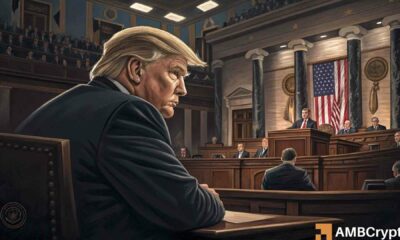DeFi under threat? What the U.S. Senate is planning for the sector

- The U.S. Senate has proposed a new act that could limit DeFi’s growth in the country.
- DeFi protocols remained unaffected, and tokens did not witness any price depreciation.
Over the last quarter, the DeFi sector experienced limited growth, with most protocols showing underwhelming performance. Liquid Staking emerged as an exception, demonstrating stronger results compared to the vast majority of other protocols.
Realistic or not, here’s UNI’s market cap in BTC’s terms
However, things could get much worse for the DeFi sector going forward due to the U.S Senate’s recent proposal.
What is the U.S. Senate up to?
The U.S. Senate proposed a new bill that supposedly aims to combat money laundering, crypto-facilitated crime, and sanctions violations. The legislation aims to subject DeFi services to similar anti-money laundering (AML) and economic sanctions compliance requirements as other financial entities, such as centralized crypto trading platforms, casinos, and even pawn shops.
The goal is to ensure greater accountability and security in the crypto industry while curbing illicit activities associated with cryptocurrencies.
The proposal highlights the concerns of the U.S. government that DeFi has become a favored avenue for bad actors, including criminals, drug traffickers, and hostile state actors like North Korea, to transfer and launder illicit funds.
According to the proposal, these entities have shown a keen interest in exploiting the decentralized nature of DeFi to facilitate illegal activities, such as cross-border fentanyl trafficking and financing the development of weapons of mass destruction.
The bill will be called Crypto-Asset National Security Enhancement and Enforcement (CANSEE) Act and will be used to target money laundering and sanctions evasion involving DeFi.
How will these sanctions work?
The legislation specifies that if a sanctioned individual, such as a Russian oligarch, utilizes a DeFi service to evade U.S. sanctions, the individuals who control the project will be held accountable for facilitating such a violation.
In cases where no centralized control exists, any entity investing more than $25 million in developing the DeFi project will assume responsibility for these compliance obligations.
Moreover, the CANSEE Act would mandate crypto kiosk operators (crypto ATMs) to enhance fund traceability by verifying the identities of all parties involved in each transaction.
According to the proposal, addressing these vulnerabilities is essential to prevent criminals from exploiting crypto kiosks for money laundering related to drug trafficking, human trafficking, scams, and other unlawful activities.
The people react
The crypto space did not take the bill proposed by the U.S. Senate lightly. Many crypto and DeFi enthusiasts took to Twitter to criticize the proposal.
The Crypto Council for Innovation (CCI) was one of the first to speak on this subject. The organization asserted that the proposal lacks a practical framework to effectively tackle illicit finance within these sectors.
1/ Today, @SenJackReed, @SenatorRounds @SenatorWarner and @SenatorRomney intro a bill to apply AML and sanctions obligations to “backers” and “facilitators” in the DeFi space, along with new and onerous requirements for crypto ATMs.
— Crypto Council for Innovation (@crypto_council) July 19, 2023
The CCI believed that the proposal imposed legal obligations on individuals who have no real means of influencing protocols once they are deployed and does not consider the distinctive characteristics of blockchain-backed systems.
As a result, the proposal is deemed inadequate in addressing the specific challenges presented by decentralized and blockchain technologies.
The proposed legislation presents some additional peculiarities that have raised concerns among CCI. One such concern was the ambiguity surrounding the definition of “control.”
According to the proposal, the Treasury will have the authority to decide what constitutes “control” over a DeFi project, leaving the determination seemingly disconnected from established legal frameworks. This lack of clarity may potentially create confusion and legal uncertainties for those involved in DeFi services.
Another point of contention is the inclusion of the arbitrary $25 million valuation threshold. The proposal failed to provide a clear rationale or methodology for determining this specific amount.
According to the CCI, it remains uncertain why this particular valuation was chosen and how it aligns with the objectives of the legislation.
How is the DeFi sector doing?
At press time, there wasn’t much volatility seen across DeFi protocols throughout various sectors. According to Token Terminal, activity on Uniswap [UNI], MakerDAO [MKR], and Lido [LDO] remained relatively steady over the last 24 hours.
Read Lido’s [LDO] Price Prediction 2023-2024
The news of the Senate’s recent proposal did not have a large impact on these protocols’ tokens as well. The prices of UNI, MKR and LDO did not witness any decline according to Santiment’s data.
However, the network growth of all these tokens fell in the last few days, indicating that new users had started to lose interest in these tokens.








